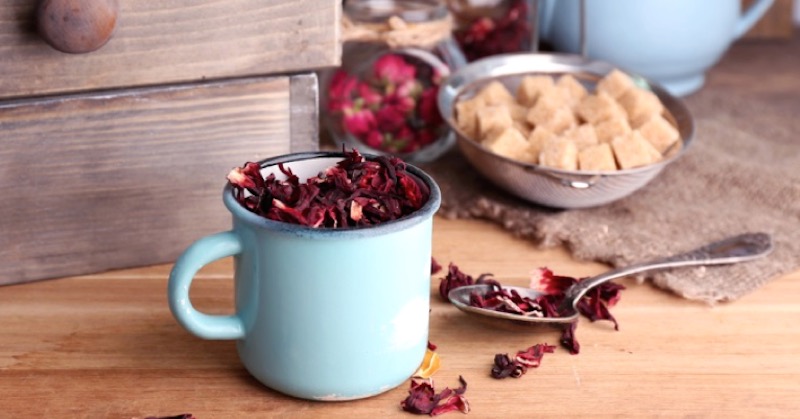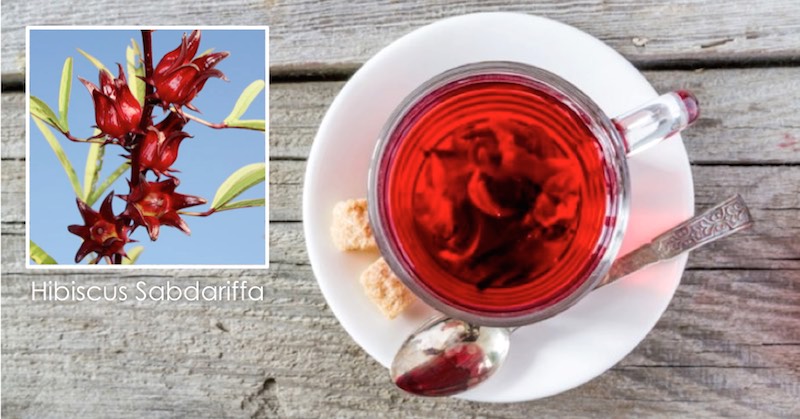How To Strengthen Your Bladder Health With This Unique, Red Hibiscus Tea
Last updated on
The bladder isn’t an organ most of us often think about. At the very end of the urinary system, the bladder doesn’t seem to have much impact on our health; most people hope to notice their bladders only when they have to “go.”
However, the fact is, over a third of all women experience bladder problems, such as urgency or incontinence, throughout their lives. Pain and discomfort due to bladder dysfunction is incredibly common, which means we could all do with a little more consideration for our bladder’s well-being.
As always, what we eat has a significant effect on the performance of our organs, our bladders included. Surprisingly, the answer to many bladder problems might already be decorating your home.
Hibiscus, when dried and infused with water, is a wonderfully natural―not to mention tasty―bladder aid that everyone should know more about.
What Is Hibiscus Tea?
The big, beautiful blooms most commonly associated with the name hibiscus do not make up this healthful tonic. Actually, hibiscus is a vast and varied genus of flowering plant, which includes the bright white Hibiscus arnottianus, the pale pink Hibiscus hirtus, the light yellow Hibiscus hispidissimus, and the stunning red Hibiscus rosa-sinensis.
The Hibiscus sabdariffa, usually called the roselle flower, creates large magenta blooms which have long been coveted for their healing properties. In particular, a portion of the flower called the calyces, which protects the petals while the bud is growing, contains the most potent nutrients for bladder health.
After the calyces are harvested and dried, they can be used to create a number of delicious beverages; in fact, nearly every culture has its own twist on hibiscus tea. A popular drink in Mexico, agua de Jamaica (or simply Jamaica) is prepared by soaking the dried hibiscus in water with a number of spices, often ginger, clove, and cinnamon, and pressing and straining the solution.
The juice is then served over ice, making for unique refreshment. In Sudan, karkade requires days of soaking the flowers in ice-cold water to achieve the perfect taste. Nearly everywhere else, hibiscus drinks are much easier to make: Drinkers simply steep sachets of dried hibiscus in boiling water to achieve a delectably sweet and tart tea.
How Hibiscus Tea Helps
Because of all the nutrients the flowers contain, the list of hibiscus tea benefits is nearly endless. Nearly a third of the tea is healthy and organic acids, including vitamin C (ascorbic acid), tartaric acid, and citric acid, which work to detoxify the body, which helps nearly every organ function more effectively. Detoxing also reduces inflammation, helping you look and feel better.
However, most importantly, hibiscus tea is a diuretic, which means it increases the rate at which you go. The more you urinate, the better your body can rid itself of toxins before they cause harm, particularly to the bladder. This also helps to regulate your body’s blood pressure.
Usually, the bladder contains bodily contaminants until you decide to use the restroom, so by answering nature’s call more frequently, you mitigate damage done to this crucial organ. Thus, with fewer pollutants eating away at its delicate lining, the bladder has time to repair and grow stronger.
Drinking hibiscus tea provides a number of passive benefits to your bladder, as well. Common beverages like soda and coffee are deleterious to your bladder; the unnatural sugars and high caffeine tends to irritate the bladder’s lining and cause pain and bleeding. By replacing these beverages with hibiscus tea, you can help your bladder heal and avoid taking in additional toxins that continue to hurt your body.
Check out this hibiscus flower tea, it is one of my favorite brands—very potent, lovely red, pleasant taste, and most important, it works not only to strengthen bladder health, it is also good for lowering hypertension naturally.
Other Useful Diet Tips
Hibiscus tea is powerful stuff, but you can do more to improve your bladder’s health. While you sip your new favorite beverage, you might consider following these bladder safety diet tips for even more health and well-being for the most under-appreciated organ:
- Avoid excess sugar. Food companies love to add sugars to products, but all that extra sugar is bad for “down there.” In fact, too much sugar can cause bladder infections (also called UTIs) because bacteria love the sweet stuff as much as you do. Replace foods containing artificial sugars with sweet whole foods, like fruits.
- Avoid hot spices. There is a reason you suffer the day after you eat a particularly spicy meal. The same chemicals that burn your mouth can burn your bladder, causing damage and pain. You would do better to avoid intense spices altogether, but if you can’t cut them out completely, you should limit intake of your hot spicy meals.
- Avoid dairy. Currently, there is no consensus whether dairy products hurt or help bladder sufferers, but if you have had any trouble with lactose in the past, you would do best to stop eating any and all milk-based products. You might keep a journal to track diet and symptoms to determine whether dairy is right for you.
If you experience chronic bladder problems, you absolutely should consult a doctor. Your regular physician or your urologist will be able to diagnose your precise bladder issue and prescribe effective treatments. However, if you wish to improve your bladder’s strength overall, adhering to these simple dietary rules and sipping some hibiscus tea will keep you healthy and happy for years to come.
Author:

Some of the links I post on this site are affiliate links. If you go through them to make a purchase, I will earn a small commission (at no additional cost to you). However, note that I’m recommending these products because of their quality and that I have good experience using them, not because of the commission to be made.
Comments
Leave a Reply



































 JOIN OVER
JOIN OVER
That herb is called Sorrel. First time I’m hearing it being called by that name.